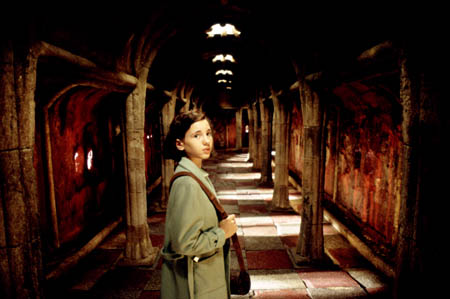|
Reviews of Recent Independent, Foreign, & Documentary Films in Theaters and DVD/Home Video
Written & Directed by: Guillermo del Toro. Produced by: del Toro, Bertha Navarro, Alfonso Cuarón, Frida Torresblanco & Alvaro Augustin. Director of Photography: Guillermo Navarro. Edited by: Bernat Vilaplana. Music by: Javier Navarrete. Released by: Picturehouse. Language: Spanish with English subtitles. Country of Origin: Spain/Mexico. 112 min. Rated R. With: Sergi López, Maribel Verdú, Ivana Baquero, Alex Angulo, Doug Jones & Ariadna Gil.
Young actress Ivana Baquero is charmingly stubborn as Ofelia, an only child who moves with her pregnant mother into the home of her new stepfather, the monumentally wicked Captain Vidal. Interested only in the impending birth of his son as well as the disposal of the rebel army hiding in the nearby mountains, Vidal is the cinematic bastard of the year. He maintains a shoot now/ask questions later policy that rarely proves effective, and enjoys torturing his captives as much as Ofelia loves escaping into one of her many fantasy books. As Vidal, Sergi López (Dirty Pretty Things) impeccably creates a character that commands our hatred, the most sinister presence in a story mostly void of ambiguity – this is purely a battle of good versus evil. At the behest of a butterfly-like fairy (comparisons to Tinkerbell will not be uncommon), Ofelia discovers an unkempt garden that acts as her refuge from the neglectful adults back home. When a quietly intimidating faun, Pan (Doug Jones), reveals itself, the child embarks on a trio of fantastical tasks that allows the filmmakers to paint the screen with regal set pieces and introduce an array of ogres inspired by the old Warner Brothers cartoons and the darkest of horror films. Following the joyously satirical Hellboy (2004), del Toro once again displays his growing ability of injecting the odd into the ordinary without allowing one to overpower the other. When Ofelia faces the temptation of eating a forbidden grape (it plays better than it sounds), the moment is as heart pounding as Vidal’s torture of an exposed traitor among his staff.
It should be mentioned that although Pan’s Labyrinth qualifies as a three-act fairy tale, the film in no way shies away from the horrors of a bloody, win at any cost war. There are more than a few moments of unexpected, graphic violence, a nod not only to earlier del Toro fare, such as The Devil’s Backbone (2001), but an acknowledgment of the tactical differences between the battles being fought by Ofelia and the rebel soldiers. Still, every action has a purpose, and del Toro uses the varying degrees of violence to keep his audience from ever feeling completely at ease with what’s about to happen, ultimately creating one of the most haunting and intense film experiences of the year. Michael Belkewitch
|

